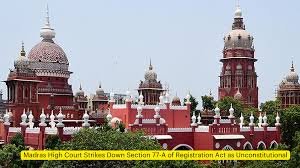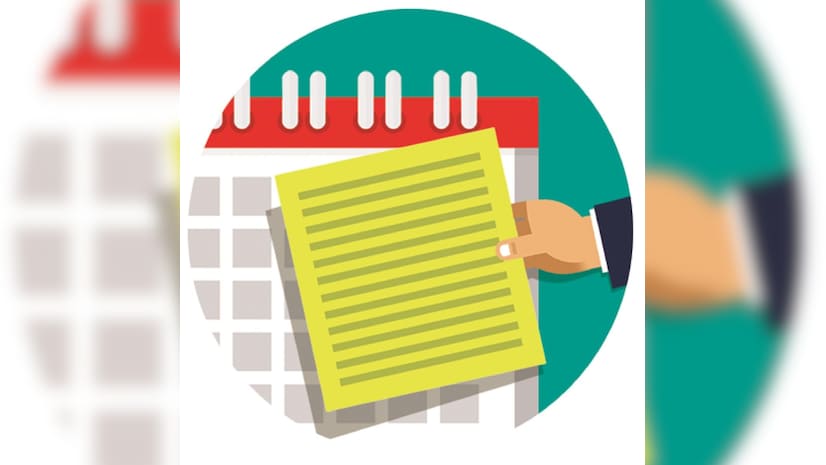Madras High Court Declares Section 77-A of Registration Act Unconstitutional
Overview of the Judgment
The Madras High Court recently declared Section 77-A of the Registration Act as unconstitutional. This landmark decision has significant implications for property registration processes in India. Section 77-A, introduced through an amendment in 2022, mandated additional procedural requirements for property registration, which the court found to be in violation of constitutional principles.
Impact on Property Registration
The court’s ruling effectively nullifies the additional requirements imposed by Section 77-A. This section had introduced new compliance mandates that were seen as overly burdensome and intrusive. The High Court’s decision is expected to streamline property registration procedures, making them more efficient and less complicated for citizens. The judgment emphasizes the need for fair and transparent processes in property dealings, ensuring that administrative requirements do not infringe upon constitutional rights.
Legal and Constitutional Analysis
The court’s decision hinged on the argument that Section 77-A violated fundamental rights guaranteed by the Constitution of India. The ruling asserted that the section’s requirements were disproportionate and encroached upon the rights of individuals to property. The judgment reinforces the principle that laws must align with constitutional values and protect citizens’ rights without imposing excessive restrictions.
Reactions and Future Implications
The ruling has been met with widespread approval from legal experts and property rights advocates. It is seen as a victory for transparency and fairness in property transactions. Going forward, the decision may prompt legislative bodies to review and amend other regulations that could potentially infringe upon constitutional rights. The judgment sets a precedent for evaluating the constitutionality of similar provisions in other legal contexts.

Why This News is Important
Protection of Constitutional Rights
The decision by the Madras High Court to strike down Section 77-A of the Registration Act underscores the judiciary’s role in protecting constitutional rights. By ruling the section unconstitutional, the court has reinforced the importance of ensuring that legal requirements do not infringe upon fundamental rights. This ruling is a significant reminder of the balance that must be maintained between regulatory measures and individual freedoms.
Impact on Legal Framework
The court’s ruling is critical for shaping the future of property registration laws in India. By eliminating the procedural hurdles imposed by Section 77-A, the judgment is expected to simplify property transactions and make the registration process more accessible. This is crucial for both individuals and businesses engaged in real estate, as it promotes a more efficient and user-friendly legal framework.
Precedent for Future Cases
The judgment sets an important legal precedent for future cases involving the constitutionality of legislative provisions. It highlights the judiciary’s role in scrutinizing laws to ensure they adhere to constitutional principles. This ruling may influence how similar cases are approached and interpreted in the future, emphasizing the need for laws that are both fair and constitutionally sound.
Influence on Legislative Processes
The decision could prompt a re-evaluation of existing and proposed legislation to ensure that it aligns with constitutional values. Legislators may need to consider the court’s findings when drafting new laws or amending existing ones, particularly those that impact citizens’ rights and administrative procedures. This could lead to more rigorous assessments of legal provisions and a greater emphasis on protecting individual freedoms.
Historical Context:
Background Information on Section 77-A
Section 77-A of the Registration Act was introduced through an amendment in 2022. The amendment aimed to impose additional procedural requirements for property registration, including more stringent documentation and compliance measures. The intent behind this section was to enhance transparency and curb fraudulent activities in property transactions.
However, the introduction of Section 77-A was met with criticism from various quarters. Critics argued that the additional requirements were overly burdensome and infringed upon individual rights. The legal challenge against Section 77-A was based on the assertion that it violated constitutional principles, particularly the right to property and fair legal processes.
The Madras High Court’s ruling marks a pivotal moment in the ongoing debate over property registration regulations. By declaring Section 77-A unconstitutional, the court has addressed concerns about the impact of the section on individual rights and legal fairness, setting a significant precedent for similar legal challenges.
Key Takeaways from “Madras High Court Declares Section 77-A of Registration Act Unconstitutional”
| Serial Number | Key Takeaway |
|---|---|
| 1 | The Madras High Court struck down Section 77-A as unconstitutional. |
| 2 | The ruling nullifies additional procedural requirements for property registration imposed by Section 77-A. |
| 3 | The court emphasized that the section violated fundamental rights guaranteed by the Constitution. |
| 4 | The decision is expected to simplify property registration processes and promote fairness. |
| 5 | The judgment sets a precedent for evaluating the constitutionality of legislative provisions. |
Important FAQs for Students from this News
1. What is Section 77-A of the Registration Act?
Section 77-A of the Registration Act was introduced in 2022 and mandated additional procedural requirements for property registration. It aimed to enhance transparency but faced criticism for being overly burdensome.
2. Why did the Madras High Court strike down Section 77-A?
The Madras High Court declared Section 77-A unconstitutional because it was deemed to infringe upon fundamental rights guaranteed by the Constitution, particularly the right to property and fair legal processes.
3. What are the implications of this court ruling on property registration?
The ruling eliminates the additional procedural requirements imposed by Section 77-A, simplifying the property registration process and making it more accessible and transparent for individuals and businesses.
4. How does this decision affect future legislation?
The judgment sets a precedent for evaluating the constitutionality of legislative provisions. It may prompt legislators to review and amend existing or proposed laws to ensure they align with constitutional principles.
5. What was the reaction to the court’s ruling?
The decision was widely approved by legal experts and property rights advocates. It is seen as a victory for transparency and fairness in property transactions and may influence future legislative and legal considerations.
Some Important Current Affairs Links















